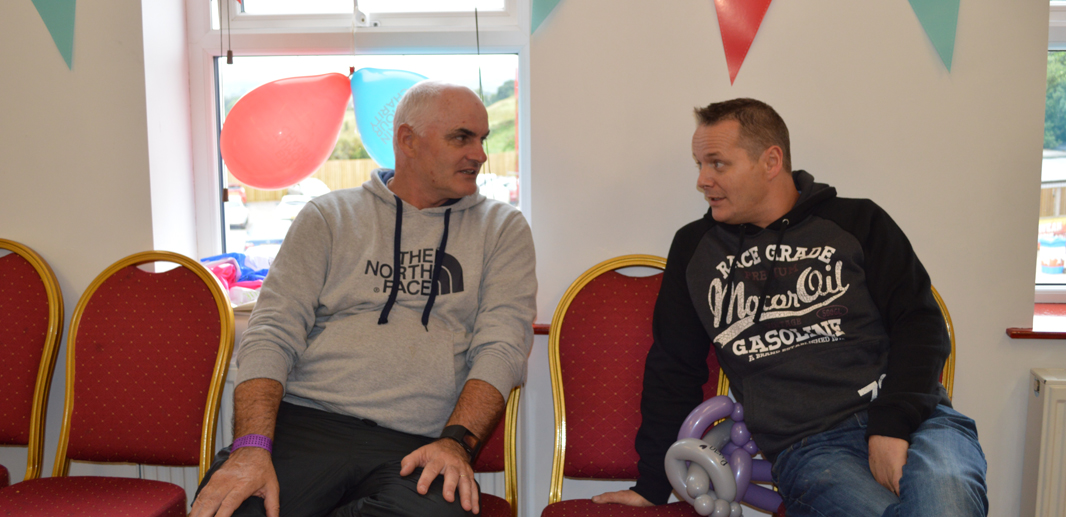A common side-effect of a brain tumour is speech problems and difficulty with cognition (the mental process involved in knowing, learning, and understanding things). We understand that whether you’re the person affected, or a carer, friend or family member, this can be frustrating, upsetting and isolating. But we’re here with you at every step of a diagnosis to help you during this difficult time.
Something to remember
Where communication problems are more severe, families can feel isolated as they cannot discuss the day-to-day things, make joint decisions or express their feelings as easily together.
Verbal communication is only part of communication. Non-verbal communication such as facial expression, tone of voice and touch can help people communicate with family and friends.
It’s also important to remember that communication is a partnership between people, so both parties take some responsibility for finding a successful way to communicate.
Top tips for helping someone with speech and cognition problems
Reduce distractions
Ensuring the radio or TV aren’t loud can help both the speaker to better articulate what they want to say and understand what you say. But it can help the listener to focus and hear what the speaker is saying too.
Break things down
Using shorter, less complicated sentences and stressing the key words in the sentence can help the person better hear and understand you. For instance, instead of saying ‘I was thinking maybe you’d like to go out for something to eat tonight? Where should we go?’ you might say ‘Shall we eat out? Italian or Chinese?’
Use non-verbal communication
If a person is struggling to understand what is said, this may be helped by using pictures, facial expression, tone of voice, gesture or writing to support what you’re saying.
Ask what kind of help they would like
It’s useful if families and friends can agree with the person how much help he or she wants. Some people like help at appointments but not at home. Others like help when they’re tired. Some don’t like others ‘talking for them’. If you’re not sure and see someone struggling, ask if they would like help.
Talk around
Talking around (or circumlocution) is when someone describes what they’re trying to remember to help themselves, or someone else, recall the word. For instance, if you know they want to ask about steroid tablets but can’t get the word out you could say ‘you wanted to ask about the tablet. It’s the little blue one you take. You take 4 mg a day’ and see if this helps.
Use sound cues
Another technique is using a ‘sound cue’ by giving the first sounds of the word. For example if the cue above didn’t help you could say ‘you wanted to ask about your ster…’. Although you know the answer, it gives the person a chance to say it for themselves.
Give them options
You can also try offering two options, for instance ‘did you want to ask about your radiotherapy or your steroids?’ The person may then find it easier to recall the word once they’ve heard it.
Encourage them to be aware
It can help to encourage the person speaking to monitor their speech, and be aware of it, as it might vary during the day, with good and less good times.
Ask for the topic
Asking the person to give you a topic first to narrow down the conversation can help you understand what they want to say.
Be honest
If you missed the conversation starting say so. Be honest and say ‘I’m sorry I wasn’t paying attention then’. Or, if you haven’t understood something, let them know. Pretending can make them feel frustrated and you might miss something important too.
Repeat what you did hear
Repeating back what you did understand means the person doesn’t have to repeat the whole sentence again, which can be frustrating and tiring.
Don’t anticipate a problem
Often people feel they can’t find the right word even though it’s a familiar word. But anticipating the problem can increase the stress a person feels and make it more difficult for them to recall.
Speak at the same volume
Don’t be tempted to speak more loudly, remember the person doesn’t have a problem with their hearing.
Rephrase what you’ve said
If they haven’t understood you, try rephrasing rather than repeating.

Join our carer’s community online
Our closed Facebook group is a safe and secure space to connect with other carers and share your experiences.
